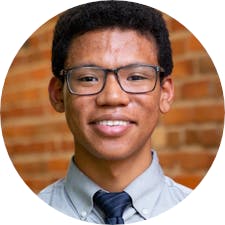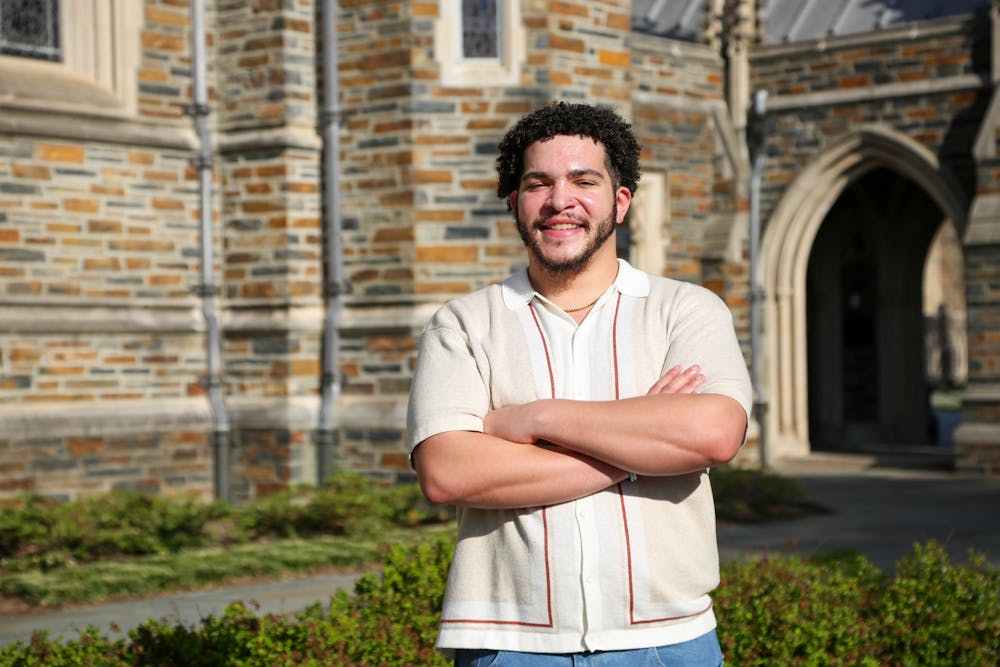When senior Isaiah Hamilton joined Duke Student Government as a first-year senator, he saw DSG as a place where he could make an impact on Duke’s social life and culture.
“I noticed that, with COVID, in the way that we were isolated and everybody was insular and kept to themselves, that there was going to be a big rebounding effect [of social life].” Hamilton said. “I wanted to get involved with that.”
Almost three years later, Hamilton, now the incoming DSG president, says he hopes to use his platform to play the “connector role” between students, faculty and administrators, with the goal of making DSG a more inclusive and collaborative organization with the rest of the student body.
After two years on the Equity and Outreach Committee, Hamilton was elected as president pro tempore, a position that presides over DSG Senate meetings and manages internal affairs. He focused on making the Senate a more efficient and welcoming place, implementing changes such as introducing electronic voting devices and creating Senate procedural cheat sheets for new senators.
But DSG was only one part of Hamilton’s involvement on campus. Hamilton also served as the president of Black Student Alliance during his term as president pro tempore. There, he implemented a new BSA family program that connects upperclassmen with first-years in the Black community, with the aim of helping new students acclimate to college life and learn from their older peers and hosted pre-professional events for Duke’s Black student community.
According to Hamilton, these relationships have been vital to his time in student government and continually motivate him in DSG. From his conversations with peers, he learned that Duke still has the potential to improve, and he learned that he wanted to be part of that change.
“I think that if you ask 10,000 different Duke [alumni] or current students, or even prospective students, what does Duke mean to them, you will get 10,000 different answers,” he remarked.
Senior Shreya Joshi, incoming president pro tempore and Hamilton’s campaign manager, wrote that running Hamilton’s campaign was a “non-question” because of how Hamilton’s vision for an “ideal Duke” resonated with her. Senior Ashley Bae, incoming executive vice president, described Hamilton as a “grounded and confident leader.”
“His deep knowledge of the campus landscape and inclination to listen and understand from many will go far. I’m excited to see him continue to reach out to student groups, collect peer opinions, advocate [with] administration, and lead DSG with empathy,” wrote Lana Gesinsky, Trinity ‘23 and outgoing DSG president, noting that DSG would be left “in good hands.”
Hamilton’s campaign
After working on the internal side of DSG for so long, Hamilton saw an opportunity to make the body more inclusive. During his time as BSA president, he has also engaged with different issues facing different Black affinity groups on campus, and he saw a need for directing DSG’s focus toward a broader range of issues. These perspectives ultimately moved him towards his campaign for the presidency.
Hamilton pointed to an array of “niche and specific needs” across campus, which he felt were just as important as those being met for “students that are in the minority.” He noted that there was still a “lack of awareness” about these needs that he wanted to bring to the forefront of his term as DSG president.
During this campaign, Hamilton spoke with students from different groups and learn about the reasons behind the demands student organizations have made over the years.
“These [demands] are no secrets to anybody at the university,” Hamilton said. “How can we use [the current environment] as leverage to help push those agendas to meet some of these demands or help reach some of these goals that have been advocated first for a long time?”
Aspirations for the presidency
When asked to describe his hopes for his presidency in one word, Hamilton would pick the word “effective,” be it with regard to communication, collaboration or delegation with his team.
Hamilton believes a vital part of this effectiveness will come from setting tangible goals. During his time in BSA, those goals took the shape of collaborations with organizations on and off campus, from other Black affinity groups to the nonprofit Student U, which mentors students in the Durham community.
For DSG, Hamilton and his executive team have identified inclusivity as a goal. With this perspective, he hopes to bring in different student organizations as “really partners in the work that we do, rather than just kind of work-adjacent” to DSG.
“A lot of what I'm hoping to bring into the organization is not what you've seen from a typical president in DSG history. I'm really hoping to come at it from more of a past leader within a cultural affinity group [perspective] and bring that sense and that knowledge and that perspective to the role,” Hamilton said.
Hamilton has seen that senators often focus on passion projects that may not reflect the needs of the Duke community. He hopes to address this through more collaboration with student groups and including them earlier in the process.
“I always kind of joke around and say, I'm waiting for the day somebody gives me one reason why collaboration is bad,” Hamilton quipped.
To facilitate relationships with student groups, Hamilton and his team have created a new diversity, equity and inclusion chair position that will serve as an “internal audit” on how well DSG is working with students from underrepresented backgrounds. The DEI chair will work with both a new outreach coordinator and the existing cabinet directors for multicultural affairs.
Hamilton also shared plans to create six new cabinet directorships focused on space advocacy, educational equity, student success, social engagement, residential life and mental health. These positions are based on feedback from the previous academic year.
Hamilton and his team also created a new body to track their effectiveness. This Reform Task Force will evaluate changes throughout the year and issue recommendations next spring.
“The reform task force will be treated as basically critical thinkers. We want to have evidence based-research, to back up why we want to make some changes, if we want to make changes at all,” Hamilton said.
In an email to The Chronicle, Hamilton shared a few priorities for projects related to multicultural affairs on campus, which include restoring and renovating the National Panhellenic Council plots behind the Bryan Center, building alumni support for the development of a Multicultural Center in years to come, creating an ethnic studies programs, supporting diverse faculty recruitment and retention and working to implement a hate and bias policy.
With all these upcoming changes, Hamilton believes that he is ready for the presidency.
“I'm just really excited for the opportunity,” Hamilton said. “I would love to make that to make Duke a better place than when I found it, and I think we have a great opportunity to do so next year, given where we are at as a community and what we're ready for as an institution.”
Get The Chronicle straight to your inbox
Signup for our weekly newsletter. Cancel at any time.

Senou Kounouho is a Pratt sophomore and a university news editor of The Chronicle's 119th volume.

